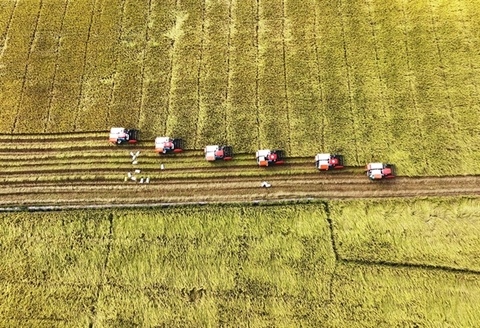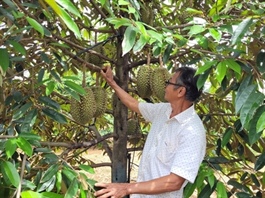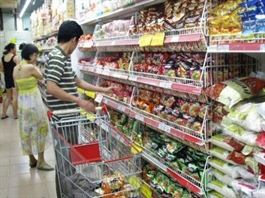Ministry urges close watch on rice market as Indonesia aims to import two million tonnes
Ministry urges close watch on rice market as Indonesia aims to import two million tonnes
Rice traders have been told to keep a close watch on international markets and develop an appropriate plan that takes advantage of the opportunities presented by the Indonesian Government’s plan to import two million tonnes of rice this year.

|
The Import-Export Department under the Ministry of Industry and Trade said that as Indonesia is among the major rice import markets of Viet Nam, any policies, moves and market developments of Indonesia would partly affect the export of Viet Nam into this market.
The ministry said that Indonesia’s rice import plan provides a significant opportunity for Viet Nam’s rice exporters, especially those who have previously had exchange activities with Indonesia.
The ministry urged domestic rice companies to increase promotions to take the opportunity from Indonesia’s import plan and boost exports into this market.
Viet Nam’s rice exporters, especially those supplying rice to Indonesia, should actively work with Perum Bulog, the State logistics agency in charge of basic foodstuffs, including rice, the ministry said.
Indonesia's decision to import two million tonnes of rice in 2023 to double its reserve from 1.2 million tonnes is an effort to stabilise rice prices and ensure food security, with 500,000 tonnes to be delivered “as soon as possible”.
This is the largest import during President Joko Widodo’s 10-year tenure after a decision in 2017 that brought in 1.8 million tonnes of rice. The decision was taken after the national rice reserve of Indonesia fell from one million tonnes in early 2022 to 230,000 tonnes in March, much below the safe threshold required at 1.5 million tonnes.
Indonesia plans to purchase 70 per cent of the reserve of 2.4 million tonnes in the major harvest crop from February until April. The paddy output of Indonesia in the major crop is estimated at 23.82 million tonnes, or 13.79 million tonnes of rice, 0.56 per cent higher than last year.
The country plans to produce 54.5 million tonnes of paddy, or 32.07 million tonnes of rice, in 2023. However, the Indonesia Ministry of Agriculture forecast that El Nino might cause drought in May–July, which could affect the harvest in July and August.
According to Indonesia's State logistics agency, although it is the harvest season, purchasing rice for reserve in the domestic market faced difficulties. In this harvest season, only around 60,000 tonnes have been bought in the domestic market for reserve.
The Viet Nam Ministry of Industry and Trade, in a notice published on its website, said that Indonesia faced difficulty in buying rice for the national reserve due to the scarcity of domestic supply caused by lower-than-expected rice harvest output, the lack of accurate statistics on the plantation as well as an inappropriate purchasing mechanism with the price set by the State.
The current purchasing price set by the State is lower than the purchasing price of the private sector, and the retail price on the market is higher than the highest retail price set by the State.
In addition, the retail price of rice has been increasing since March.
The Import and Export Department said there are opportunities for Viet Nam’s rice exporters, urging them to close watch on the market, analyse opportunities and risks to develop an appropriate export plan which would benefit both enterprises and farmers.
The department said that special attention must be paid to risks related to payment and delivery in the context of fluctuating global trade.
According to Tran Thanh Hai, deputy director of the ministry’s Import–Export Department, the increasing demand for rice from some major rice importers of Viet Nam would help Viet Nam to reach a rice export volume of around seven million tonnes this year.
Hai said that as India, the world’s largest rice exporter, continues to ban oversea shipments of broken rice, this would create a certain scarcity in the global market. Meanwhile, countries such as China, the Philippines and Indonesia have demand for rice.
With the plan of importing rice, Indonesia is a potential market for Viet Nam, Hai said, adding that Viet Nam’s rice production is being maintained at a good level with a stable supply source for export.
Customs statistics showed that Indonesia was the third largest rice importer of Viet Nam in the first two months of this year, after the Philippines and China.
Viet Nam’s rice export to Indonesia reached more than 143,780 tonnes, worth US$67.3 million at the average price of $468 per tonne, a rise of 33.7 per cent in volume and 30.3 per cent in value but a drop of 10 per cent in price over the same period last year.
Indonesia accounted for 16 per cent of Viet Nam’s rice export volume and 14.3 per cent of its value.
Recently, the State Bank of Viet Nam asked credit institutions to increase the lending for rice cultivation, trading and export in the Cuu Long (Mekong River) Delta region to meet the capital demand.




























